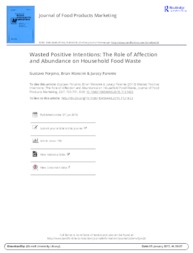Wasted positive intentions: the role of affection and abundance on household food waste.
Wasted positive intentions: the role of affection and abundance on household food waste.
Author(s): ARAUJO, G. P. de; WANSINK, B.; PARENTE, J.
Summary: This qualitative study, grounded theory oriented, identifies familial affection and preference for abundance as major drivers of wasted food in lower-middle income American families. These positive intentions provide an improved understanding of household food waste, a problem with high environmental impact and moral implications. Based on empirical data collected with twenty caregivers via in-depth interviews, observations, and analysis of photos, this study provides novel explanations, such as on how stockpiling comfort foods in abundance ? a form of both boosting positive self-emotions and showing affection for kids ? can promote more wasted food. Other antecedents identified include multiplicity of choices, convenience, procrastination and unplanned routines. In sum, this research identifies a negative outcome of affection and food abundance in the family context, while providing a theoretically relevant general framework to help understand the food waste phenomenon. Authors suggest increasing the awareness of nutritional gatekeepers through behavioral economics principles.
Publication year: 2016
Types of publication: Journal article
Keywords: Food consumption, Food waste, Low-income population
Observation
Some of Embrapa's publications are published as ePub files. To read them, use or download one of the following free software options to your computer or mobile device. Android: Google Play Books; IOS: iBooks; Windows and Linux: Calibre.
Access other publications
Access the Agricultural Research Database (BDPA) to consult Embrapa's full library collection and records.
Visit Embrapa Bookstore to purchase books and other publications sold by Embrapa.

